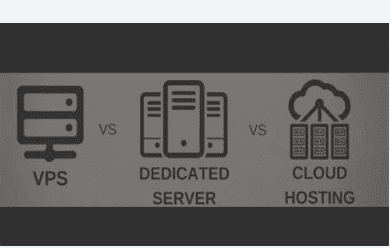Bringing your business from brick-and-mortar stores to the digital world is simple, but the challenge comes when selecting the hosting type required for it. With different types of hosting, you are always at crossroads about which one to choose. However, by taking various factors into account like performance, security, and so on, you can decide which is ideal for your business needs. For that, you must know about VPS and cloud hosting.
VPS is the virtual private server in which a single server will be replicated into multiple virtual servers. Though these servers are part of the same server, yet each virtual server will have a separate environment. With a dedicated environment, you can allocate resources and configure the settings you want for this server.
Cloud hosting is an ideal solution for companies today. Websites hosted on the cloud can be accessed from anywhere and at any point in time. The hosting resources of the site or application are replicated on cloud servers as a cluster. In case, if the traffic on one server has hit the maximum, then the traffic is routed to the other idle server connected in the cluster. This offers greater flexibility and scalability. The major difference between VPS and cloud hosting is that unlike in VPS hosting where there is one server for a website, the resources of a website in a cloud server are spread across different physical machines.
Aspects to check between VPS and Cloud hosting
Performance
Performance is the major factor to consider when planning to choose a web host. High-performing hosting will keep the website live and available for website visitors without slowing or going down.
VPS assures high performance in spite of sharing the server space with other websites. The page loading time is faster. The website is hosted on the physical server despite you having space of your own in the server partition. It has constraints on storage resources and hardware.
Cloud hosting pulls the servers based on the traffic you receive for the website. Cloud hosting offers the same reliability and speeds even where there is heavy traffic to the site. The RAM and CPU power of other servers can be utilized to manage the surge in traffic. This type of hosting also allows you to transfer files to another server when the prior one fails to reduce downtime.
Scalability
The scalability offered in a hosting service is a major requirement for many business owners. VPS gives you access to many server resources compared to shared hosting, but the scalability of the physical server is restricted. Though you can increase the memory and processing power, only to some extent. However, you can switch to a new VPS hosting plan to accommodate the server resources you want.
Cloud hosting is not confined to one server and therefore the scalability options are many. With the expansion of customers and website traffic, you can also increase the memory, storage space, processing power, and bandwidth with ease. It is easy to switch to a new plan to cope with the increased traffic.
Easy customization
Customizations are required with the rapid growth of a business. VPS hosting will allow you to customize like a dedicated server. You also have full root access to control various elements such as VPS setup, which includes the OS you want to use.
Cloud hosting will offer customization up to a certain level. You are allowed to configure firewalls, tweak the network architecture, and balance load. As this hosting is provided on a server network, therefore, the hosting provider will put a limit on what you can control.
Security
It is necessary to avoid the website or application from getting prone to security threats such as DDoS attacks, malware infections, and hackers snooping on the data. VPS hosting offers higher security. As there is a dedicated environment set up for your website on the same server, when the other company website is hacked, your website can stay intact from such vulnerabilities. You are allowed to do your security installations and customizations.
Security levels on cloud hosting are pretty high. It is also imperative for you to set up your own security controls apart from what the hosting provider offers. This type of hosting allows you to keep the website secure since the resources are divided between multiple physical servers but the website will have a higher chance of getting vulnerable to malicious attacks due to the web-based services it offers.
Value for money
VPS hosting costs you a high price since you have to pay a consistent amount every month to the hosting company. The rate that is charged would be based on the resources you availed, the server specifications you opted for and the support level you want.
Cloud hosting is much costlier compared to VPS hosting as it offers higher scalability and adequate storage space. It is tough to predict how much you have to pay every month. If there is heavy traffic in a month, you may have to pay a huge amount and vice versa.
Who should use VPS and cloud hosting?
VPS hosting
- Businesses with tight budgets
- Companies that have multiple apps
- People who want to keep their data secure
- Organizations that need around-the-clock support
Cloud hosting
- Healthcare and financial companies or companies who want quick access to data
- Businesses that are being operated in different locations
- Businesses that want flexibility
Now that you have learned the difference between cloud hosting and VPS hosting, decide which is the best for your business.



































